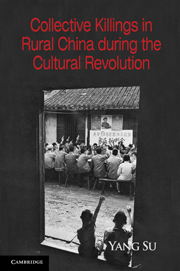Book contents
- Frontmatter
- Contents
- List of Figures
- List of Tables
- Preface and Acknowledgments
- 1 Kill Thy Neighbor
- 2 On the Record
- 3 Community and Culture
- 4 Class Enemies
- 5 Mao's Ordinary Men
- 6 Demobilizing Law
- 7 Framing War
- 8 Patterns of Killing
- 9 Understanding Atrocities in Plain Sight
- Appendix: Methodological Issues and Statistical Analyses
- References
- Index
Appendix: Methodological Issues and Statistical Analyses
Published online by Cambridge University Press: 05 June 2012
- Frontmatter
- Contents
- List of Figures
- List of Tables
- Preface and Acknowledgments
- 1 Kill Thy Neighbor
- 2 On the Record
- 3 Community and Culture
- 4 Class Enemies
- 5 Mao's Ordinary Men
- 6 Demobilizing Law
- 7 Framing War
- 8 Patterns of Killing
- 9 Understanding Atrocities in Plain Sight
- Appendix: Methodological Issues and Statistical Analyses
- References
- Index
Summary
In this appendix, I provide greater detail regarding the quantitative analyses of collective killings across counties in Guangxi and Guangdong Provinces, as analyzed in Chapter 8. I use two dependent variables: that is, whether the county had collective killings (used in the bivariate analysis in Tables 8.3 and 8.4) and the number of deaths caused by collective killings (used in the Poisson regression models in Table 8.5 and Table A3 herein). The source for the first variable is described in Chapter 2. I read the narratives in the xianzhi (i.e., county gazetteers) and decided whether there were collective-killing events in a county based on the number of deaths (i.e., ten or more in a given event) and the manner of killings. To compute the number of collective-killing deaths, I first obtained the total number of deaths during the entire Cultural Revolution. I then subtracted the deaths caused by the earlier persecutions and those caused by armed battles.
My analyses are based on data from the 65 counties in Guangxi Province and 57 counties in Guangdong Province whose xianzhi are available (of 162 rural counties in 1965). My dataset thus includes more than three quarters of the counties, and there is no reason to believe that the missing counties are biased in any particular direction regarding killings or their covariates. Because some of the covariates have missing values, the total number of counties may be less than 122 in some of the analyses.
- Type
- Chapter
- Information
- Publisher: Cambridge University PressPrint publication year: 2011



